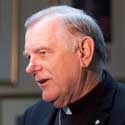MIAMI (CNS) — Traditional marriage is “best for children” and efforts to legalize same-sex marriage will “open a Pandora’s Box of unforeseen and, to be sure, unintended consequences,” Archbishop Thomas G. Wenski said during the annual Red Mass.
Delivering the homily at the April 23 Mass, Archbishop Wenski said the growing movement in support of same-sex marriage would “redefine marriage for all as existing solely for the gratification of two consenting adults” rather than for the creation of life.
He suggested that consequences of same-sex marriage would affect society much as no-fault divorce legislation did 40 decades ago.
[hotblock]
The archbishop argued to members of the Catholic Lawyers Guild that traditional marriage recognizes the sexual difference between man and woman and that social policy has long supported such marriages because they “provide the optimal conditions for the raising of future generations of its citizens.”
He stressed the difference between natural law and man-made law. He said that in recent decades, American jurisprudence has moved away from its Judeo-Christian roots — which hold that truth is “not constructed but received” — to “a radical autonomy” in which truth is determined “by one’s own will.”
“There is little reason for optimism (on same-sex marriage),” Archbishop Wenski said, alluding to the Supreme Court’s earlier decisions in Casey v. Planned Parenthood and Roe v. Wade, both of which barred the government from banning abortion. “We have gone from ‘We hold these truths to be self evident, that all men are created equal, that they are endowed by their creator with certain unalienable rights’ … to a new secular religion based on the ‘right to define one’s own concept of existence, of meaning, of the universe, and of the mystery of human life.'”
He urged the judges and attorneys, “as Catholic Christians and officers of the court,” to recall the example of St. Thomas More, the patron saint of lawyers and political leaders, and to seek his prayers.
“May you be, in his words, ‘for the greater glory and honor of God and in pursuit of his justice … able in argument, accurate in analysis, strict in study, correct in conclusion, candid with clients, honest with adversaries, and faithful in all details of the faith.'”
PREVIOUS: Rev. Bob Edgar, former NCC head, ecumenical activist, dies
NEXT: Archdiocese drops subpoena for White House records in HHS case




He urged the judges and attorneys, “as Catholic Christians and officers of the court,” to recall the example of St. Thomas More, the patron saint of lawyers and political leaders, and to seek his prayers.
And help protect ALL children from sexual abuse throughout the United States by supporting legislative proposals pending in many states that would eliminate the statute of limitations both civilly and crminally for those horrific offenses against our children.